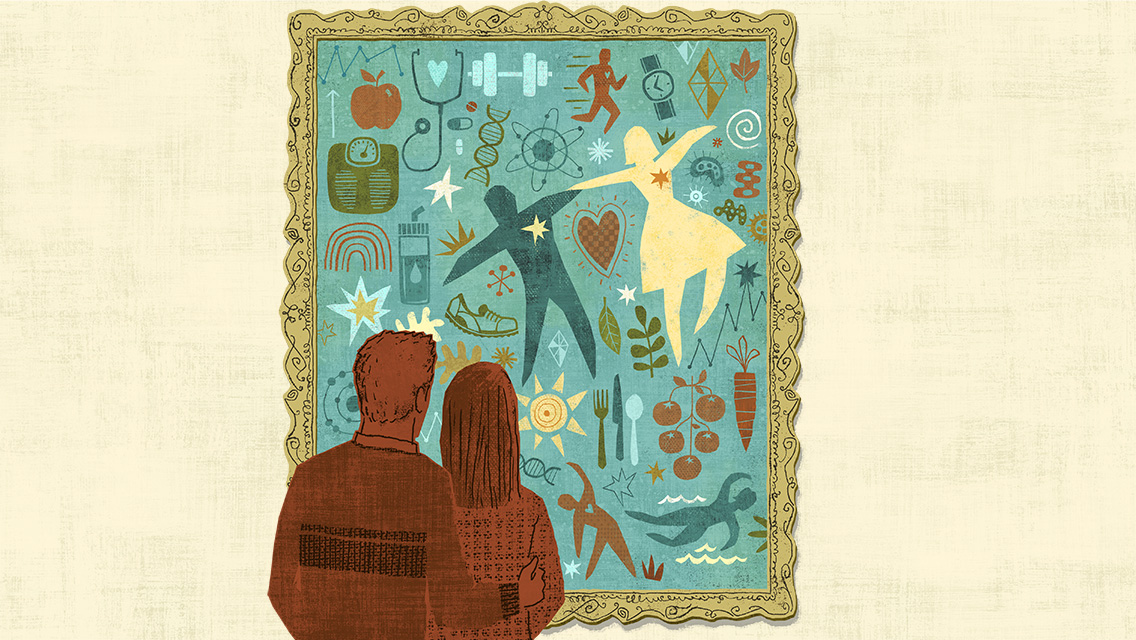I recently made the four-hour drive to my parents’ home in Wisconsin. By myself. And it was awesome.
I took my time, stopping to get coffee and peruse a couple of shops that my family and I usually speed by in our quest to get there as quickly as possible. I listened to my preferred radio stations and my own music — and maybe sang out loud at the top of my lungs to the soundtrack of The Greatest Showman. Maybe.
I also passed the time by catching up on some podcasts that had been in my queue or shared by friends. It was during an episode of the Athlete CEO, a new-to-me podcast, that I found my inspiration for this month’s column. Cohost Erik Averill was interviewing Life Time’s TEAM Alpha program leader, David Freeman (see his Experience Life cover story), and near the end of their roaming conversation, Freeman shared a statistic that gave me pause.
In response to a question on common advice in the health and wellness industry that he wishes people would ignore, Freeman noted that the myth of quick fixes is especially problematic. He went on to say the following: “We focus so much on the working-out piece, and the reality is this: If you work out five days a week, that’s five hours out of your whole week. There are 168 hours in a week, so you’ve worked out five of those 168. The 163 hours that nobody is talking about is what we really need to focus on.”
I’ve been interested in and committed to my health and fitness for most of my life, yet this was the first time I’d considered them in this context. It’s eye-opening: Five hours of exercise out of 168 hours in a week is a mere 3 percent. Yet that’s where so many of us put all of our energy when it comes to changing and improving our health and fitness.
As we’ve reported countless times in these pages, nutrition, sleep, stress management, self-care, and relationships are also essential factors in our well-being, but we often overlook them when our weight loss slows down or when our strength gains plateau. We get frustrated and usually take one of two routes: 1) go all in with our exercise routines, which is often too much too soon and results in burnout or injury; or 2) we give up, because, well, what’s the point.
Despite knowing close-up the multi-factorial elements of true health, I’ve also fallen prey to this mentality. So in an effort to get real about what I’m doing to support myself holistically, I began monitoring my time, noting how much of what I do is either in support of or detrimental to my well-being.
I discovered that, in the average week, I devote about 91 hours to the key healthy habits: five hours to self-care (reading, hobbies, relaxing); six to working out; 10 to family and social time; 21 to meal prep and eating; and 49 to sleeping. Of the remaining 77 hours, I spend about 55 of them working, 10 of them online, and 12 of them getting ready and commuting.
In these latter numbers, I see an opportunity to make some important and impactful shifts. What might be possible if I were to cut the social-media hours by half, at least, or stick to a regular workweek? I could actually train for that first triathlon. I could spend more time having fun with my family and reading a few of the books that are piled up on my nightstand.
So while there are many things in my life I can’t control (see page 66), there are at least a few affecting my health and wellness that are within my purview. Changing these is up to me. And it’s up to you, too.




This Post Has 0 Comments